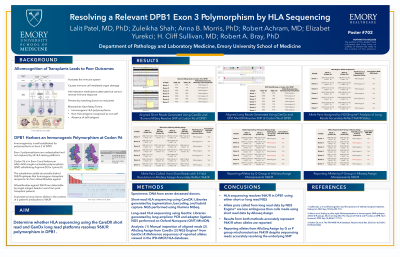Resolving a Relevant DPB1 Exon 3 Polymorphism by HLA Sequencing
(P702) Resolving a relevant DPB1 Exon 3 polymorphism by HLA sequencing
Location: Platinum Ballroom

Poster Presenter(s)
Aim: Protein coding polymorphisms in HLA genes can be immunogenic, resulting in poor outcomes for transplant patients. In the DPB1 gene, Exon 2 polymorphisms are well accepted as immunogenic while Exon 3 variants remain understudied. We recently demonstrated that an arginine/lysine polymorphism at codon 96 (96R/K) can be targeted by alloantibodies, underscoring the need to resolve this Exon 3 variant. This study assesses whether HLA sequencing using the CareDX short read and GeneDx long read platforms achieves this aim.
Method: DNA was sequenced from 7 deceased donors. Short-read HLA sequencing using CareDx was performed on an Illumina MiSeq with libraries generated by tagmentation, barcoding, and hybrid capture. Long-read HLA sequencing using GenDx was performed on an ONT MinION with libraries generated by long-amplicon enrichment. Analysis and reporting were performed using AlloSeq Assign and NGSengine for CareDx and GenDx, respectively. Resolution of 96R/K was determined by inspecting reads and by viewing the reference sequences of reported alleles in the IPD-IMGT/HLA database.
Results: Of the 7 donors, inspecting reads identified 5 heterozygotes and 2-96K homozygotes. Both long and short reads resolved this polymorphism with concordant results (Table 1). GenDx unambiguously assigned alleles to all 7 donors with reference sequences that reflect 96R/K as resolved by inspecting reads (Table 2). While 96R/K status is resolved by CareDx, some ambiguities still occurred (Table 3). All 5 heterozygous cases were reported with alternative alleles. For each case, the pair with more prevalent alleles is concordant with GenDx and both pairs reflect 96R/K heterozygosity. Interestingly, we note potential for human error when reporting after G/P grouping. Both homozygous cases carry DPB1*584:01:02, which encodes for 96K but belongs to the DPB1*39:01G/P group. Because DPB1*39:01 encodes for 96R, reporting by G/P group can misrepresent these donors as heterozygous.
Conclusion: HLA sequencing, using either long or short reads, resolves 96R/K polymorphism in DPB1. Allele calls by GenDx are less ambiguous and allele pairs called by both platforms accurately capture 96R/K status. However, CareDx reporting by G/P group can mischaracterize 96R/K status despite sequencing reads resolving this polymorphism. Manual inspection of reads for 96R/K is recommended when using CareDx.
Method: DNA was sequenced from 7 deceased donors. Short-read HLA sequencing using CareDx was performed on an Illumina MiSeq with libraries generated by tagmentation, barcoding, and hybrid capture. Long-read HLA sequencing using GenDx was performed on an ONT MinION with libraries generated by long-amplicon enrichment. Analysis and reporting were performed using AlloSeq Assign and NGSengine for CareDx and GenDx, respectively. Resolution of 96R/K was determined by inspecting reads and by viewing the reference sequences of reported alleles in the IPD-IMGT/HLA database.
Results: Of the 7 donors, inspecting reads identified 5 heterozygotes and 2-96K homozygotes. Both long and short reads resolved this polymorphism with concordant results (Table 1). GenDx unambiguously assigned alleles to all 7 donors with reference sequences that reflect 96R/K as resolved by inspecting reads (Table 2). While 96R/K status is resolved by CareDx, some ambiguities still occurred (Table 3). All 5 heterozygous cases were reported with alternative alleles. For each case, the pair with more prevalent alleles is concordant with GenDx and both pairs reflect 96R/K heterozygosity. Interestingly, we note potential for human error when reporting after G/P grouping. Both homozygous cases carry DPB1*584:01:02, which encodes for 96K but belongs to the DPB1*39:01G/P group. Because DPB1*39:01 encodes for 96R, reporting by G/P group can misrepresent these donors as heterozygous.
Conclusion: HLA sequencing, using either long or short reads, resolves 96R/K polymorphism in DPB1. Allele calls by GenDx are less ambiguous and allele pairs called by both platforms accurately capture 96R/K status. However, CareDx reporting by G/P group can mischaracterize 96R/K status despite sequencing reads resolving this polymorphism. Manual inspection of reads for 96R/K is recommended when using CareDx.

